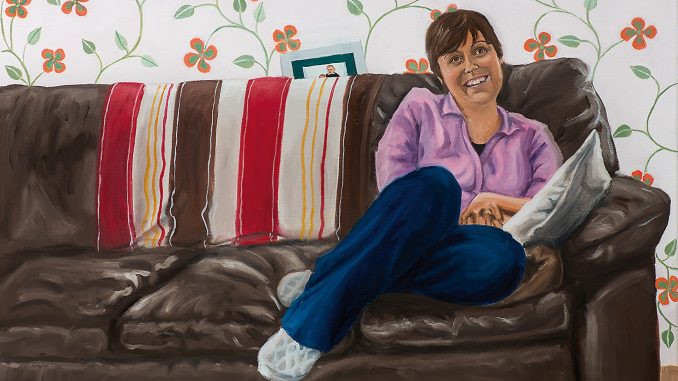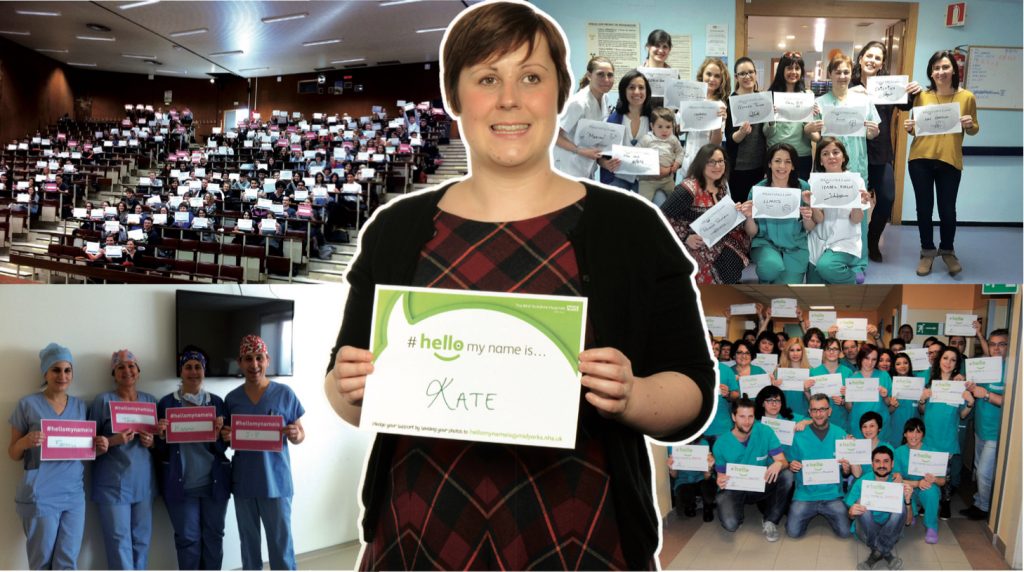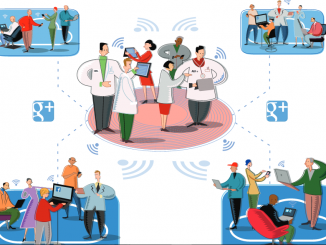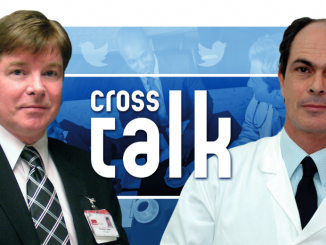
Her campaign to bring a human touch to healthcare, which she carries on even through the tough final stages of cancer, has had widespread impact and brought international acclaim. Simon Crompton talked to the woman who changed the way healthcare workers greet patients.
Kate Granger is still a bit mystified about how she became a celebrity – a healthcare poster girl, a cancer “rock-chick” as she puts it.
“I’m just a normal Yorkshire lass,” she protests. “It’s very strange that people want me to sign things and have selfies with me. I’m baffled by it everyday.” But to those who meet Kate or follow her regularly on Twitter, it’s not such a mystery. Being gloriously normal is at the heart of Kate’s success.
With the help of her husband Chris Pointon, doctor and cancer patient Kate set up the #hellomynameis campaign on Twitter in 2013. It is an attempt to get all healthcare professionals to do something very simple: introduce themselves to patients. This, says Kate, who is 34, is not just a matter of basic courtesy. It is about establishing a human connection between a vulnerable human being and someone who wants to help.
Her campaign has taken off in a big way. #hellomynameis has made over one billion impressions on Twitter, with healthcare professionals declaring their support and displaying their #hello my name is… name badges in selfies. The campaign tapped into a wave of unease about depersonalisation in the UK’s National Health Service and triggered a new drive for “compassionate care”, gaining support from the Prime Minister, the Health Secretary and more than 100 health providers and organisations. It has also been commended in major reports.
The campaign’s influence now goes well beyond the UK, with offshoot campaigns in France, Germany, Italy, Spain, the United States and a hugely successful #hellomynameis pledge in Australia.
Kate agreed to have her portrait painted
to challenge assumptions about what dying looks like.
It was painted by Antonia Rolls as part of her exhibition
‘A Graceful Death: portraits and words from the end of life’
In the past year the acknowledgements and accolades have come thick and fast. When I meet her at her small home in Wakefield, she’s just received an honorary doctorate from London South Bank University. Before that she’d been presenting the Kate Granger Compassionate Care Awards organised by NHS England; before that conducting a speaking tour around 16 hospitals and health organisations; receiving an honour (MBE) from Prince Charles; receiving the Pride of Britain Award; receiving the award for the most inspirational people in health…
In her front room, she proudly points me to the pictures of her husband and nephew and nieces that decorate the mantelpiece and sideboard, but when I ask her of the whereabouts of the awards and certificates, she says they’re on a shelf upstairs.
“There are too many of them to show anyway,” she says with a blunt, dry charm. That doesn’t mean they haven’t given her pleasure. This year has also seen her receive fellowships from the Royal College of Physicians of both London and Edinburgh.
“I’m the youngest Fellow in the London college’s history, and they’ve never made a non-consultant or doctor a Fellow before.” (She qualified as a consultant geriatrician shortly after I spoke to her.) “I don’t know whether they just felt sorry for me and decided to give me the fellowship early,” she says with a mischievous grin. “It was a very nice day anyway.”
But the reason why Kate is so honoured, widely read, and adored by 42,000 followers on Twitter has nothing to do with feeling sorry for her – even though the desmoplastic small round cell cancer that she lives with is widespread and terminal. Ever since the cancer was first diagnosed in 2011, Kate has assumed she might have just months to live.
The reason is that she is doing extraordinary things with her limited time. But she is also being entirely ordinary. Her Twitter followers know all about her love of baking, her family, her love of the NHS, her band practice (she plays second flute), and her determination (often severely challenged) to stay positive in the face of aggressive chemotherapy and poor prognosis. Through it all, they also see her resolve to keep practising as a geriatrician and leave a wider legacy of health professionals relating to patients as people.
“I think I seem to have developed a very powerful voice, in the sense that it’s credible and authentic,” she says. “I haven’t got it in for every healthcare professional, but I do have a vision of the health service. I have my quality improvement eyes on whenever I’m being a patient, and I guess I can write about that in a way that lay patients probably can’t. I think it’s about a simple message delivered by someone with an authentic voice.”
Being in the public eye isn’t always easy. When I meet Kate, it’s just a few weeks after her fourth course of chemotherapy – and she says she hasn’t got her confidence back yet. “Some days I don’t feel like putting on my make-up and being the public Kate,” she says. But she pushes on, aware that the legacy she is working on is important.

She tells me that audience members sometimes cry when she gives talks. What particularly makes them cry? I ask. “The bit when I say that I’m determined not to be remembered as that tragic young doctor who died of cancer, rather than somebody who was creating a legacy. That bit tends to get them bawling.” She laughs.
How it started
The story of Kate Granger’s cancer journey tells you everything you need to know about the importance of her campaign. “I do have a story,” she says. “It’s quite an upsetting story at times, isn’t it? Nobody really wants to watch a girl in her 30s talking about her own demise or the suffering she’s been through, do they? But the story has a message that people can take away with them and use in their own practice.”
Kate found out she had cancer while on holiday in California with Chris in 2011. She’d been tired for weeks – which she’d unsurprisingly put down to the 100-hour weeks she was working as a junior doctor – and then she had severe back pain. CT scans revealed that she had tumours in her abdomen and pelvis that were pressing on her ureters, causing kidney failure. She returned to the UK for further tests and MRI scans.
She still finds it hard to talk about what happened next.
“I was in an admissions ward. I never saw the same doctor twice and the nurses weren’t coming, so I was in pain. I was by myself, 29 years old, scared, hating the cancer diagnosis and with this vault of uncertainty ahead of me.”
The doctor was not to blame.
He was unsupported by senior staff and simply
too junior to effectively deliver a death sentence.
“And this junior doctor came to see me and just sat in the chair by my bed. He didn’t introduce himself. He just looked out of the window and said: ‘I’m really sorry but your cancer’s spread.’ No checking what I knew already, or whether I wanted someone with me. He couldn’t wait to get out of the room. So I said just give me the report, and I looked through it and all these bad words were popping out. Mets? I didn’t know I had mets. I had hundreds of questions, but I couldn’t ask them because he didn’t have any answers. It was just awful. He went and I was just left. I don’t want anyone to go through that experience again.”
It was the worst experience she has had with cancer, she says, but she is adamant that the doctor was not to blame. He was unsupported by senior staff and simply too junior to effectively deliver a death sentence.
The experience that led to her founding #hellomynameis came later, in August 2013.
It had been a bad few days: Kate had become unwell with an infection following surgery to replace the stents draining her kidneys. So she was admitted “kicking and screaming” to the emergency department. Kate knew from her professional experiences how stressful Accident & Emergency could be for staff, but she’d had no idea how stressful it could be for patients.
“I just couldn’t believe the impersonal nature of care, and how people seemed to be hiding behind their anonymity,” she says. “It’s really really important to me to know who I’m talking to, but it was really hard to extract the name of the junior doctor who was treating me. And it was all so task-orientated. So yes, I got my appropriate tests, and bloods, and got my antibiotics quickly – but there was no personal interraction during that time. And if they’d bothered to interact they’d have found out that actually I’m quite scared of needles, having spent a couple of years having had little else done to me. But it was just wham bam!”
What happened that evening was in complete contrast. A porter took Kate, still in severe pain with a postoperative infection, on a ten-minute journey from the emergency department to the urology ward. It is significant that Kate still remembers his name.
“Brian introduced himself to me. He had a name. He gave me blankets. He had genuine kindness. And it made a massive difference to me. I was starting to despair and he came along and made the day a little better. Then there were a few more days in hospital, with people not introducing themselves, and the ones who did making me feel better and safer about being in hospital.”
She got onto Twitter, expecting her spontaneous campaign to amount
to a couple of tweets and a chat with a few like-minded health professionals.
But the catchy hashtag started to spread.
So she talked to Chris about her experiences, and he said she should do something about it. So she got onto Twitter, expecting her spontaneous campaign to amount to a couple of tweets and a chat with a few like-minded health professionals. But the catchy hashtag started to spread. Kate started writing articles about her experiences in national newspapers, blogs and then books and the momentum grew. Today #hellomynameis is arguably the most successful health campaign ever launched by an individual in the UK.
“For me, the campaign comes to life when it reaches out of social media into healthcare organisations, when somebody who’s seen it on Twitter says ‘I want to bring that to my hospital’ – and then does. That’s when it really has an impact.”
The woman behind the hashtag
Kate, of course, underestimates the impact of her own character on the campaign’s success. Originally from Huddersfield, Yorkshire, the daughter of teachers, the young Kate worked in the kitchens of a day centre for older people run by her mother, during school holidays. Those experiences of talking to older people, “realising what an amazing bunch of people they are,” fed her interest in becoming a geriatrician when she trained in medicine in Edinburgh. Medicine, for her, was not about the science, but the people – talking to them, finding out about them, working out the clues to their illness.
Her experiences as a patient, she says, have made her a much better doctor.
In particular, she’s learned about the importance of sharing information.
Those family-forged values of helping people are at the heart of #hellomynameis… “I think it’s the teacher in me that makes me want to write and share my experiences. I teach juniors, medical students and other health professionals at work, and I think it’s part of me because of my family. I have this great frustration when I’m sat in a hospital bed, not being able to be a doctor. I’m thinking: what can I do? I can use my experience to say this isn’t right, can you think about this, can we change this so that it doesn’t have to happen to other people. It’s kind of teaching on a big scale.”
Her experiences as a patient, she says, have made her a much better doctor. In particular, she’s learned about the importance of sharing information. “It’s so frustrating, as a patient, sitting there all day wondering about stuff, wondering whether it’s okay to ask about your blood test, whether there’s going to be a scan, what happens next. If that information was just shared naturally, things would be so much easier.”
She can’t understand why some doctors seem to avoid engaging with patients for fear of being asked difficult questions. “I like the difficult questions!” she laughs. “They’re more interesting.”
“If you find out about problems sooner, you have strategies
to overcome them and save time later on.
We think we don’t have time, but we do.”
Some, I suggest, avoid engagement because of time pressures. She bridles: “That’s such a fallacy. It’s just so wrong.” She tells me she was telling her junior doctors yesterday how her 20-minute conversation with a patient’s family had provided clues about his condition and circumstances which would help with discharge planning and save hours of time later on. “If you find out about problems sooner, you have strategies to overcome them and save time later on. We think we don’t have time, but we do.”
I ask her about her “bucket list”, which she started writing the day she learned she had metastases. She’s ticked off most of the items, including: watching the BBC Pride and Prejudice in one sitting; eating fish and chips at a favourite family seaside resort; getting a tattoo; skydiving; learning to make brioche with Michel Roux Junior; eating at the Fat Duck restaurant; starting work as a fully qualified consultant; traveling to Barcelona, New York, Bruges, and returning to Edinburgh and California. Her partner Chris is very good at organising things for her, she says, adding that he never gets the accolades she does. I promise I’ll mention him.
But Kate is very aware that her time for achieving more is limited. She tells me how she’s had four courses of aggressive chemotherapy since 2011, each time reluctantly.
“It did cross my mind to never start. Most people would say, just give me the chemo: I want to live longer. But I knew how rough this might be. I’d looked after patients going through similar chemotherapy and I’d seen what their mouths looked like, how they lost all their platelets, how they had fevers that wouldn’t get better. But at that early point I had a family that hadn’t yet come to terms with my diagnosis. I didn’t really have much of a choice. I could have been selfish and not had it, but it would have been no good for them.”
So each time she’s just “knuckled down”, accepted “it’s going to be rubbish” and got on with it. Each time the treatment has been less effective, and each time her bone marrow has found it harder to recover. She’s not sure she’ll do it again, she tells me. But she has. Her fifth course of chemotherapy began on 4th April 2016.
A legacy of kindness
The prospect of death is never very far away. “If I knew I were to die tomorrow, I’d feel proud of #hellomynameis, how far we’ve come with it, and how hard we’ve worked on it. And I’m proud of things outside health. I’m proud of those little people there,” (she points at the picture of her nephew and niece) “and I’ll always be the doting aunty who buys too many presents.”
And when she dies, if anyone starts talking about her “losing her battle with cancer” she’ll turn in her grave, she says. Someone inevitably will, I suggest. “Don’t worry, I’ve got Chris briefed,” she laughs.
I suggest to her that the reason people flock to her talks, and follow her life every day on Twitter, is that she refuses to let there be anything ‘tragic’ about her at all. It’s as if she’s acknowledging but defying all the bad things about cancer – not by being superhuman, but by being entirely normal. By asserting the simple things that make life worth living: courtesy, family, friendship… and the joys of baking.
In answer, she shows me a small portrait of her (on top of the page), commissioned as part of an exhibition called ‘A Graceful Death’. It portrays Kate sitting on her sofa, smiling – just the way I’ve been seeing her now. The picture was, she tells me, exhibited alongside harrowing pictures of thin, ill people about to die. “I wanted to define the face of dying a bit like the girl next door. It doesn’t look ill. It has a fairly healthy complexion.
“I guess sharing my story is getting people to think about dying, talk about it and be more open about it. You walk down the street, you don’t know who’s got a terminal diagnosis do you? We’re not all tucked up in hospice beds!”




